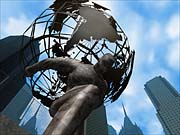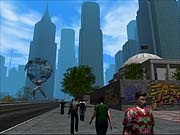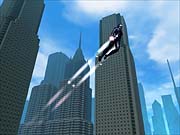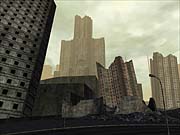City of Heroes Q&A
An online RPG without dragons and magic users? It's true, and we've got all the details about this superhero game from Cryptic's Jack Emmert.
In the past, massively multiplayer online role-playing games were exclusively the domain of fantasy-oriented worlds. Ultima Online and EverQuest both attracted thousands of users, and then the deluge of look-alikes and copycats began. Eventually, it seemed as if nearly every development company in the market had announced plans for a persistent world experience that would outdo all those that came before. While it appears that there are dozens of new MMORPGs scheduled for release in the next few years, most of them will be competing directly with each other for clients, as many of them share similar fantasy-based or futuristic settings and derivative styles of play.

A few games have the potential to stand apart, however, and Cryptic Studios' City of Heroes is one of them. The game--which was recently picked up for publishing by NCSoft, the creator of the immensely popular Lineage: The Blood Pledge--promises to bring a new experience to players who have swung their swords and fired off their rifles in the MMORPGs of the past. In an original virtual city, thousands of players will be able to take on the role of superheroes to fight crime and earn fame, influencing the course and potential outcome of a constantly evolving storyline.
First looks at the game have been exciting, depicting teams of superheroes fighting thugs and villains using a variety of superpowers and masked vigilantes taking flight or leaping tall buildings in a single bound. A wide assortment of different superhero character types and powers have been unveiled, and as the first trickles of information have come our way, City of Heroes has started to shape up as a potentially refreshing twist on what has come to be expected from online role-playing games.
We had the chance to sit down with Jack Emmert, City of Heroes game designer and cofounder of Cryptic Studios, and he filled us in on what we can expect from his team's ambitious first project.
GameSpot: You must be very busy preparing for next month's Electronic Entertainment Expo. Thanks for taking the time to give us the first word on this exciting game. Can you give us a bit of background on the premise behind City of Heroes?

Jack Emmert: The city of heroes is Paragon City--America's greatest metropolis. Since its founding, Paragon City has been a center for commerce, education, and manufacturing. Because of Paragon City's place at the head of American society, quite naturally she attracted the first of the world's superhumans. As time passed, Paragon City became synonymous with the term "superhero."
In recent years, the world suffered a devastating invasion from extradimensional beings called the Rikti. From their base of operations in Paragon City, the Rikti brought the planet to its knees, until Earth's heroes rallied and beat back the alien hordes. Though the war was won, some Rikti still remained at large--and Paragon City has been devastated. Supervillains, sensing Paragon City's weakness, flooded to it like sharks hunting a wounded fish. Paragon City's leading hero organizations sent out a call for help.
GS: What goes on in Paragon City, and what are its inhabitants like?
JE: Paragon City is much like any large, East Coast city--very developed, large buildings, and labyrinthine streets. The game is set several months after the war with the Rikti, so many parts of the city are operating normally, though many areas are still quite ruined. The inhabitants are the type of people you'd see in any city--normal people going about their normal lives. It's up to the players to protect them.
A Game With Character
GS: Were you influenced by any particular comics when establishing the visual feel of the game?

JE: No, none in particular. I think the visual feel of the game is drawn from a number of sources, including comic books. We all agreed, however, that the game should feel as "modern" as possible. In other words, our heroes and villains will resemble those that you might encounter in today's comics rather than ones you'd see in the '40s or '60s.
GS: How does character creation work?
JE: First, players choose a basic body type--female, male, or gargantuan male. Then players select an origin type. Each origin has its own advantages and disadvantages. Some origins allow a player to choose more total powers, but those powers are capped at a certain level, while other origins have fewer powers available to the hero, but those powers have a much higher maximum level. After choosing the origin, players spend points on the hero's basic attributes: strength, stamina, agility, willpower, intelligence, and personality. The third step is the choosing of the powers. We have a robust list of superpowers that a hero can have, and a starting player need not fill up all his or her available power slots in the beginning. In fact, players might want to save a few slots for later when they acquire more experience points. Next, players purchase the skills for their character, which determine how well a hero can do certain actions. Lastly, players get to create their own costume.

GS: Can you tell us more about the origins? What effect will they have on the characters?
JE: There are six basic origins that a player may choose from: superior human, altered human, mutant, gadgeteer, cyberware, magical powers, and mystic relic. As mentioned earlier, each origin has its own advantages and limitations. Players will be able to compose the details of their own origin, though how that information will be shared with other players is not yet settled.
GS: What options are available for your character's appearance and costume?
JE: Currently, each origin type allows a different range of selections for the hero's costume. Things that are available to a mutant might not be available to a cyberware hero. Broadly, players choose to work on one body area at a time--head, upper body, lower body. Once that area is selected, players can modify the geometry, the pattern, and the colors of various portions of that area. In the upper body, for instance, players have the option to work on the chest, the gloves, the belt, and the shoulders. There are thousands of combinations.
GS: What kind of superpowers will players be able to choose from?
JE: We've captured many of the powers that you'd associate with comic book heroes. These are broken down into two categories: control powers and core powers. Control powers, such as fire control and cold control, have a several subpowers that provide a degree of versatility. Someone with fire control can hurl balls of fire, summon a cage of fire, wreath him- or herself in fire, and so on. Core powers are more straightforward--an energy blast is only an energy blast, nothing else. Core powers, however, can be far more powerful than their control power equivalents. A fireball's maximum power level cannot match the maximum level of energy blast.
GS: Will players be able to control villains, or is the game strictly for "heroes"?
JE: No, not in the first release. We are planning on a villain expansion, though the details haven't been finalized yet.
GS: Is there an economy system in place? What kind of items can characters find?
JE: Heroes will be able to find, buy, and trade technological and magical items. The focus of the game will be on players increasing their hero's powers, attributes, and skills; items will play more of a complementary role in what a hero does.
In the Zone
GS: What will differentiate a newly generated character from an experienced one?
JE: More experienced characters will have more powerful superpowers, access to different types of missions, and the ability to add unique pieces to his or her costume.

GS: Does City of Heroes use the same mission-based system that is popular in other MMORPGs? How do characters find things to do?
JE: Missions are a large part of the gameplay. Players go to various hero organizations throughout the city to receive these missions. Each hero organization will have its own "flavor" of missions. Vanguard, for instance, was founded by the UN to fight against the Rikti--so naturally its missions often might include Rikti as foes. Missions are generated to match the level of the heroes.
GS: Will the gameworld be split into zones? If so, what types of zones will there be?
JE: The gameworld will be split into three basic types of zones: safe zones, city zones, and hazard zones. Safe zones are where heroes will shop for items, receive missions, go on missions, build bases, and meet other heroes. In safe zones, villains will not be wandering around in search of someone to attack; it is only in hazard zones where heroes will encounter villains out in the open. Certain areas of the city are so dangerous that they've been walled off by force fields. These are the hazard zones. In city zones, anything can happen! Each zone can also be a different area of the city: downtown, industrial, docks, warehouses, or even ruins.
GS: What will combat be like in City of Heroes?

JE: Players choose the weapon they are using (weapon, fist, power, and so on) and target a foe. Heroes can specify damage location for certain special effects. A headshot, for instance, might temporarily stun a foe, but it's much harder for the hero to land a blow. A hit to the legs might slow an enemy down, but it doesn't do quite as much damage. In addition to the ability to target areas, a hero can also set how offensive and defensive his or her attacks are. If a player decides to slide the bar toward the offensive side, the hero will deal more damage, but he or she will be an easier target for enemies. If a player slides the bar toward the defensive end, the hero won't be able to dish out as much damage, but he or she will be harder to hit.
GS: What effect will teaming up have on the game? Can you establish permanent teams or bases?
JE: Players are encouraged to form permanent teams! As part of a team, players can go on larger missions, tackle tougher foes, and build a base. Teams will be able to pool resources to buy equipment that would be beyond the reach of a single hero. Heroes don't always need to go on missions with just their team members--a hero can form ad hoc teams on spur of the moment with other heroes he or she might just happen to bump into.
GS: Is there player vs. player combat?
JE: Yes. Heroes can face off against other heroes in designated arena sites throughout the city.
GS: Can characters die? What are the penalties for being incapacitated in battle?
JE: Heroes don't exactly die, but when they are defeated and on the brink of death, they are instantly teleported to a hospital that will treat their wounds. The penalty for this is a loss of experience, money, and fame.
GS: How many people will each server be able to maintain? Will there be a single global server, or many smaller realms?
JE: We are aiming at somewhere between 2,000-3,000 concurrent users on a server. We will have multiple servers, or continuities, for the players. Each continuity will evolve at its own pace, depending on the actions of the players.
GS: Is there anywhere our readers can go for more on the game as we approach E3?
JE: Make sure to visit Cryptic Studios' City of Heroes Web site for more information.
GS: Thanks for your time, Jack. We look forward to seeing the game at E3.
Got a news tip or want to contact us directly? Email news@gamespot.com
Join the conversation